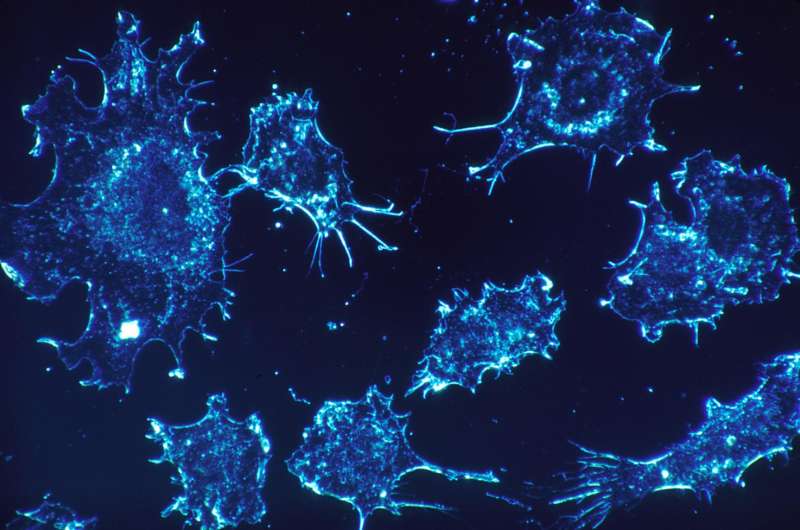
A breakthrough study has found that palliative-focused care is better placed than radiotherapy to maintain quality of life for people with terminal oesophageal cancer who have had a stent fitted, and that radiotherapy has no positive effect on survival for these patients.
Published in The Lancet Gastroenterology and Hepatology, “Radiotherapy after Oesophageal Cancer Stenting (ROCS)” is the first study of its kind to analyse the effects of radiotherapy on ability to eat in the weeks after stent insertion, and survival, for this patient population.
The randomised control study was conducted by researchers at the Marie Curie Palliative Care Research Centre at Cardiff University and Tayside Cancer Centre, Ninewells Hospital, Dundee. It was funded by the National Institute of Health Research, after it was identified that evidence was lacking on whether giving radiotherapy actually succeeds in improving swallow and quality of life for these patients.
Having demonstrated that radiotherapy increases symptom burden and visits to hospital toward the end of life, but does not improve survival, the researchers conclude that radiotherapy should not be routinely offered to this patient group.
Furthermore, it is recommended that multi-professional support, such as through a palliative care referral, should be triggered when people with advanced oesophageal cancer are first referred for a stent. The end of life charity, Marie Curie, welcomes the landmark paper and adds that it raises important questions around quality of life for people who are at the end of their lives and the need for open and honest conversations between clinicians and patients about the right treatment for them.
Professor Anthony Byrne, from the Marie Curie Palliative Care Research Centre at Cardiff University, said, “This group of patients, on average, do not have much life ahead of them so with this study we wanted to understand how we can support people to make the most of the time they have left—is radiotherapy worth pursuing, or should we be focusing on supporting people with the social and emotional impacts of their disease? These are the important, real-world, questions that we hoped to answer with this work. The clear outcomes underline the importance of inviting terminally ill patients—who are often excluded from trials—to be part of research which can guide the care most relevant to them.”
Dr. Dougal Adamson from Tayside Cancer Centre in Dundee, who co-led the study, said, “We knew that people may receive radiotherapy at this advanced stage of their illness but it wasn’t known whether this treatment option was effective in helping with swallow or quality of life, until now. The results are clear. Giving radiotherapy as extra treatment after an oesophageal stent is fitted does not improve survival and makes patients feel worse. This research can help patients focus on how to maintain the best quality of life possible, and it can help clinicians put the right things in place for people to spend as much of their life as possible away from a hospital and being free from the unnecessary side effects of radiotherapy.”
Dr. Sabine Best, head of research at the end of life charity, Marie Curie, said, “This is an extremely important piece of research on many levels. It fills a significant knowledge gap around the suitability of an intense treatment for people who are close to the end of their lives. In addition, this work demonstrates that high quality research into how we support terminally ill people is vital and possible. The challenges of research with people who are dying are not insignificant but here we can see the importance of challenging what is possible to improve the quality of life for so many.
“We are pleased to see the profile of palliative care raised in this work and hope that it helps clinicians discuss what is important to each person. During this study many patients expressed their concerns around eating, sharing meals with friends and family, and other social impacts of their illness. It is vital that clinicians help enable these types of conversations so patients know that their fears about quality of life are equally as valid as managing the symptoms of their illness.”
The U.K. study analysed the effectiveness of radiotherapy in improving survival rates and other ‘burdens’ associated with end of life within this population, such as recurrent and long-duration hospital admissions and severe difficulties swallowing food or liquid (dysphagia).
The findings show that patients receiving ‘usual care’ support decided on a holistic basis, such as palliative and support intervention, nutritional (dietetic) advice, and community-based ‘follow ups’, had the same median prognosis and faced fewer ‘treatment burdens’.
The study, conducted over a five-year period across 23 centres in the UK, could play an important role in empowering practitioners and oesophageal cancer patients—who have had self expanding metal stents (SEMS) – to make informed end-of-life health and care choices.
Source: Read Full Article
